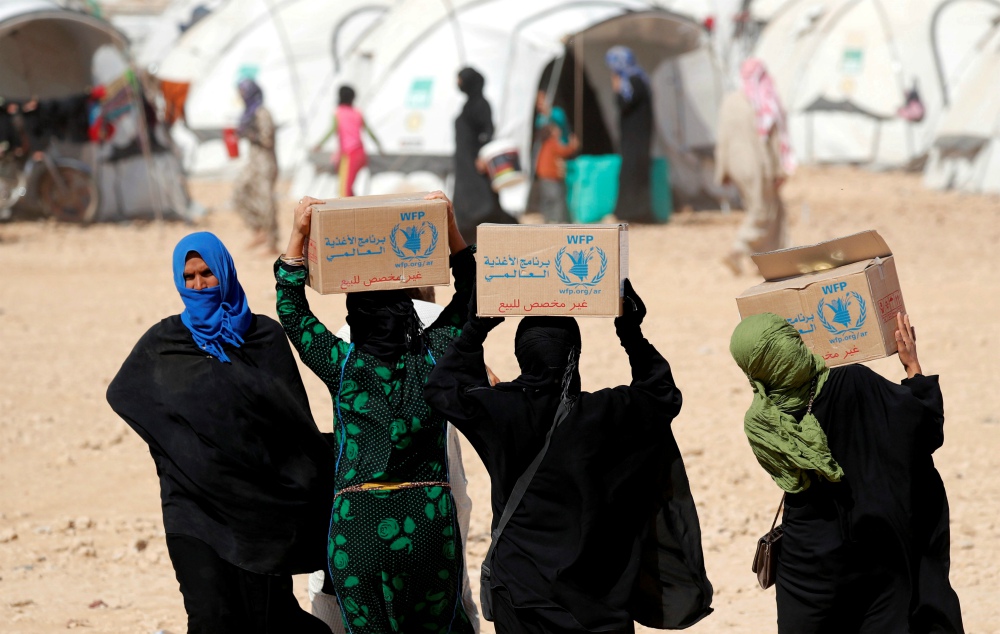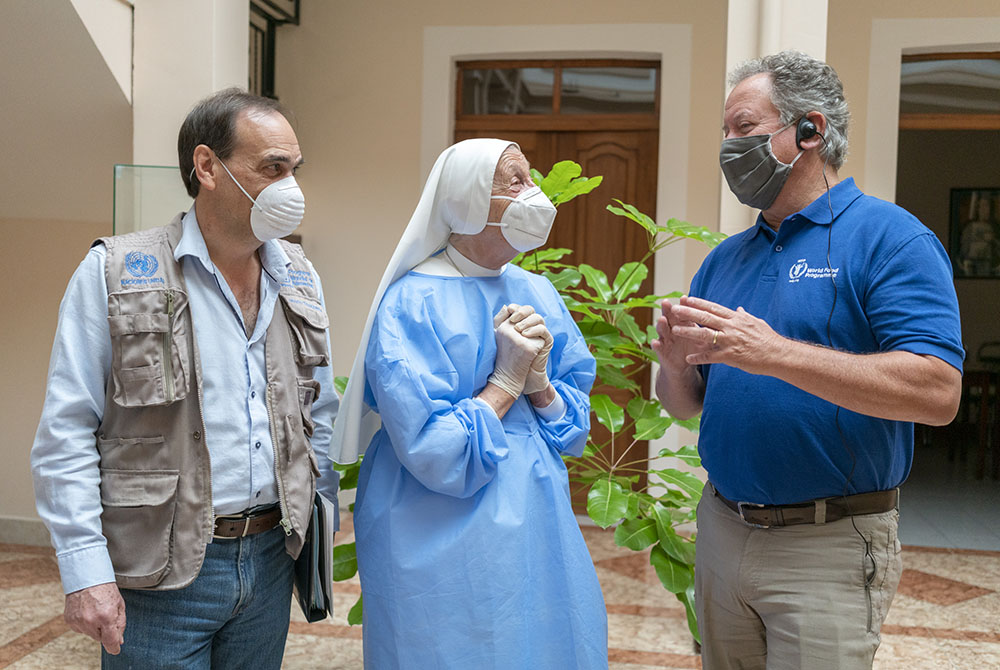
People displaced by fighting between the Syrian Democratic Forces and Islamic State militants carry boxes of food aid from the World Food Program at a camp in Ain Issa, Syria. (CNS/Reuters/Erik De Castro)
The Oct. 9 announcement that the World Food Program received the 2020 Nobel Peace Prize felt like an honor not only for the world's largest humanitarian organization focused on hunger and food, but for wider humanitarian efforts everywhere, including the work of Catholic sisters.
That's because the World Food Program — the main food agency of the United Nations, providing direct assistance to places experiencing hunger, drought and famine — works with sister congregations and other church-based humanitarian groups like Caritas, Jesuit Refugee Service and Catholic Relief Services. All of these groups share a recognition that without tackling the problem of hunger, there can be no real peace in the world.
Catholic Relief Services, which is based in Baltimore, took note of that fact in its statement of congratulations: "Conflict, climate change and the spread of COVID-19 have led to a tsunami of need."
The work of the World Food Program "puts a global spotlight on these growing needs while hopefully also signaling a renewed commitment to meet those needs," Catholic Relief Services said in the statement. "If the pandemic has taught us anything, it's that we're all interconnected."
Sr. Joan Mumaw, a member of the Sisters, Servants of the Immaculate Heart of Mary and the president and chief administrative officer for Friends in Solidarity, the U.S. partner to Solidarity with South Sudan, had a similar reaction.
"The prize to the World Food Program signals a recognition of the larger humanitarian efforts in the world," said Mumaw, who works to promote the ministry of Solidarity, a collaborative effort of women and men religious to train nurses, teachers, midwives and future leaders in war-torn South Sudan.
"It's a signal to recognize the broader needs in the world right now," she told me.
While Solidarity has not worked directly with the World Food Program, Solidarity staff, like other humanitarians, have used the program's transport to get to hard-to-reach places. (On my international assignments, I've not taken a World Food Program flight like Mumaw has. But I have seen the program's work everywhere, particularly visible in the sacks of rice and other grains at refugee and displacement camps.)
Mumaw said that the World Food Program's work in South Sudan is widely respected. "Their staff works hard to reach people who need food."
Others working in South Sudan feel this keenly.
Sr. Marilyn Lacey, executive director of the humanitarian agency Mercy Beyond Borders and a member of the Religious Sisters of Mercy, told me a few days after the Nobel Peace Prize announcement that the World Food Program has been "remarkably steady and helpful" to Mercy Beyond Borders' programs in South Sudan, with staff on the front lines who are attentive, brave and kind.
Lacey said recent cutbacks had caused the World Food Program to stop delivering food to many schools in the country. But that was not the case with Mercy Beyond Borders' St. Bakhita Girls' Primary School in Narus, which is the first and largest all-girls school in South Sudan.
"I met the truck drivers and asked them why we were still getting supplies and they said because this school is so unique in the entire country," Lacey said of a 2019 pre-pandemic visit to South Sudan. "So they've really been a lifeline to us. We can't say enough. I'm delighted that they got the Nobel Prize."
The citation for the Rome-based World Food Program noted the explicit connection between food and peace.
"The link between hunger and armed conflict is a vicious circle: war and conflict can cause food insecurity and hunger, just as hunger and food insecurity can cause latent conflicts to flare up and trigger the use of violence," the Nobel Peace Prize announcement said. "We will never achieve the goal of zero hunger unless we also put an end to war and armed conflict."
Of course, the issue of hunger in the world is complex, and the work of the World Food Program is only one part of solving the challenges of a hungry world, particularly during this time of global pandemic.
"Acutely 'food insecure' people could increase by 80%, from 149 million pre-COVID-19, to 270 million by the end of 2020 in the 79 countries where WFP works," World Food Program spokesperson Kyle Wilkinson told me in an email.
"The WFP is mobilizing to meet food needs of up to 138 million people in 2020 — making this the biggest humanitarian operation in WFP's 60-year history," he added.
"Yet, while food needs are growing, WFP's funding shortfall has grown to about $5 billion since the onset of the pandemic. Bridging this funding gap is critical."
Advertisement
The pandemic's effect on hunger deeply troubles Sr. Teresa Kotturan, an Indian Sister of Charity of Nazareth who works in New York representing the Sisters of Charity Federation at the United Nations. She said the current crisis puts a spotlight on longstanding injustices and inequities in the world.
Kotturan told me the World Food Program becomes the "face of peace" in areas of conflict like South Sudan.
But, she said, providing humanitarian assistance during crises, while absolutely necessary, is not the long-term solution to lasting peace or food security, which is the safe and sustainable access to food.
"It's good that the work of the WFP is being recognized," Kotturan said. But the broader question remains: "How do we bring about systematic change?"
That includes empowering struggling local farmers, who face challenges not only because of the pandemic but because their crops often can't compete in the market because of cheaper imported goods.
Kotturan also noted that large donor countries to the World Food Program, like the United States, are also the chief manufacturers of arms in the world.
"It's as if there's killing with one hand and feeding with the other," she said.
Kotturan told me the well-deserved awarding of the prize is a moment to reflect on "global solidarity and the need to ask what is causing these crises" of hunger, war and climate change.
Mario Touchette, the World Food Program's country representative in Ecuador, told me that he and his colleagues know their work is just one part of the fight against hunger, though he noted that the program's mission goes beyond responding to the immediate crises caused by conflict and natural disasters. That includes nutrition programs for schools, despite recent challenges like the pandemic.

From left: Mario Touchette, the World Food Program's country representative in Ecuador; Salesian Sr. Arcangela Piazol; and David Beasley, executive director of the World Food Program during a July visit to a canteen the Salesian sisters run in Ibarra, northern Ecuador (Courtesy of the World Food Program/Ana Buitron)
And, he said, the work of the World Food Program is augmented by its partners, which in Ecuador include Jesuit Refugee Service, Caritas and several congregations of religious men and women. This includes the Salesian sisters, who run a World Food Program-supported program in Ibarra, northern Ecuador, providing meals for Venezuelan and Colombian migrants.
The sisters hosted Touchette and David Beasley, World Food Program's executive director, during a visit in July. The sisters were among those who offered messages of congratulations for the Nobel win to Touchette, Beasley and their colleagues.
Hearing from the sisters was touching, Touchette said, as were congratulations from one group of World Food Program beneficiaries: women and children living at a shelter for survivors of domestic violence.
"It's humbling. We take pride in our work, but we do have to be humble about it," he said. "We don't do it alone. We do it with our donors and our partners, like the sisters."
Touchette paused and choked up slightly, recalling World Food Program personnel who have been killed in their work.
"Maybe this prize is a way not to forget them — to recognize their work, and their contribution."
[Chris Herlinger is GSR New York and international correspondent. His email address is cherlinger@ncronline.org.]







